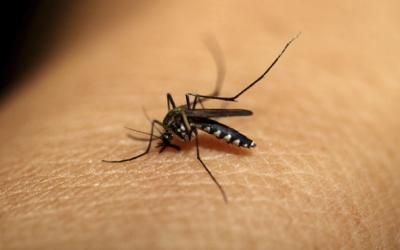- Latest news▼
-
12:16, April 19 Scientists grow human mini-lungs in lab

-
10:23, April 19 JAMA Oncology: Urine test can help rule out high-grade prostate cancer with almost 100% accuracy, study shows

-
18:00, April 18 Daily Mail: Elderly woman in China gets infected with brain-eating amoeba

-
14:19, April 18 Obesity: exercising before breakfast helps you lose weight faster

-
10:42, April 18 The Conversation: childhood trauma can cause pathological hoarding

-
08:37, April 18 Daily Mail: Satiating food reduces cravings for sweets, nutritionist says

-
18:22, April 17 First Armenian-German Conference entitled “Heart Failure Spring School”

-
08:38, April 17 Why do kids usually recover from COVID-19 more easily than adults?

-
14:37, April 16 Daily Mail: intermittent fasting is not suitable for children and women before their periods

-
16:41, April 15 Cell: in carriers of defective BRCA2 gene, sugar consumption increases cancer risk

-
15:04, April 15 305 cases of measles recorded in Armenia so far in 2024

-
14:38, April 15 Food and Environmental Virology: tea contributes to effective coronavirus control

-
12:41, April 15 Daily Mail: vitamin A, B3 and E supplements can be dangerous

-
10:56, April 15 Diabetes Care: evening physical activity is good for the heart

-
08:27, April 15 Women are more susceptible to blood loss and death during bypass surgery than men, researchers say

All materials
Malaria vaccine could be available within months

A new jab against malaria could prevent millions of cases, scientists claim.
Researchers say the vaccine, which has just completed the final stages of testing, could make a ‘substantial contribution’ to controlling the disease.
As The Daily Mail reports, drug firm GlaxoSmithKline has applied for a licence from the European Medicines Agency (EMA) for the RTS,S vaccine.
The news is significant because RTS,S is the first malaria vaccine to reach advanced trials. Tests were carried out on 15,500 toddlers and babies in sub-Saharan Africa.
Among those who had three doses of RTS,S and a booster shot, the number of clinical cases of malaria – those confirmed by a doctor – was reduced by 36 per cent after four years.
But the protection waned over time, boosters worked less well than the initial dose and the vaccine was not as effective in younger children, a report in The Lancet journal says. Scientists have worked on the vaccine for more than 20 years – at a cost of more than £330 million, but experts say there is a long way to go.
There is no licensed vaccine against malaria anywhere in the world and researchers say they are hopeful the results will be sufficient for RTS,S to gain a licence from the EMA. The World Health Organisation could then recommend its use by October this year.
In the trials, an average of 1,363 cases of clinical malaria were prevented over four years for every 1,000 children vaccinated, and 1,774 cases in those who also received a booster.
Over three years, an average 558 cases were averted for every 1,000 infants vaccinated, and 983 cases in those also given a booster dose.
Professor Brian Greenwood, the study’s author and professor of clinical tropical medicine at the London School of Hygiene and Tropical Medicine, said: ‘Despite the falling efficacy over time, there is still a clear benefit from RTS,S.
‘Given that there were an estimated 198million malaria cases in 2013, this level of efficacy potentially translates into millions of cases of malaria in children being prevented.’
But he said he was ‘disappointed’ by the results of the clinical trials, adding: ‘I hoped the vaccine would be more effective, but we were never going to end up with the success seen in measles vaccines, with 97 per cent efficacy.’
The disease is difficult to treat because the malaria parasite has a complicated life cycle and has learned how to evade the human immune system over hundreds of years.
The latest World Health Organisation figures show that of the 198million cases in 2013, 584,000 people died. Most victims are children in Africa, where one dies every minute.
Currently, the most effective prevention measure is the use of mosquito nets. The trial involved 15,459 infants aged six to 12 weeks and children aged five to 17 months from Burkina Faso, Gabon, Ghana, Kenya, Malawi, Mozambique and Tanzania.
Follow NEWS.am Medicine on Facebook and Twitter
- Video
- Event calendar
- Archive
- Most read
month
week
day
- WHO: Nigeria pioneers revolutionary meningitis vaccine 1212
- One-third of women experience menstruation-related migraines, most often during premenopause - study 1207
- Food and Environmental Virology: tea contributes to effective coronavirus control 1134
- Daily Mail: vitamin A, B3 and E supplements can be dangerous 1131
- Cell: in carriers of defective BRCA2 gene, sugar consumption increases cancer risk 1097
- 305 cases of measles recorded in Armenia so far in 2024 1089
- Women are more susceptible to blood loss and death during bypass surgery than men, researchers say 985
- Diabetes Care: evening physical activity is good for the heart 939
- Daily Mail: intermittent fasting is not suitable for children and women before their periods 929
- First Armenian-German Conference entitled “Heart Failure Spring School” 692
- Obesity: exercising before breakfast helps you lose weight faster 600
- The Conversation: childhood trauma can cause pathological hoarding 592
- Daily Mail: Elderly woman in China gets infected with brain-eating amoeba 591
- Why do kids usually recover from COVID-19 more easily than adults? 589
- Daily Mail: Satiating food reduces cravings for sweets, nutritionist says 555
- Find us on Facebook
- Poll





